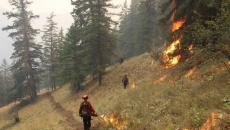High housing prices have forced many Canadians to accept that they may never be able to afford buying their own home.
But what if they can't afford to rent one?
Strong demand for rentals and a shortage of homes are both contributing to soaring rental costs. And that's making it even more difficult for people to save money for down payment on a home.
The asking rent across Canada hit an average of $2,078 in July, up nearly nine per cent on an annual basis, according to data from Rentals.ca and research firm Urbanation released last week.
For the first time ever, average asking rents for purpose-built condominiums and apartments rose above $2,000 in July. One-bedroom apartments alone saw a 13 per cent annual increase in the average rent and a monthly rise of 2.5 per cent, bringing July's figure to $1,850.
For most minimum-wage workers, affording these rents with their earnings is impossible.
A recent analysis by the Canadian Centre for Policy Alternatives found there are only three census metropolitan areas where the minimum wage is high enough to afford rent for a one-bedroom apartment. All three are in Quebec.
The need to construct more purpose-built rentals, which refers to buildings where the dwelling units were always intended to be rented out, rather than sold, is becoming all the more pressing.
And experts are urging the federal government to leverage all the tools they have — from tax measures and financing help — to make that happen.
It's a problem that has been building up for a long time.
An RBC report published at the end of last year found the population of renters increased at a rate three times faster than that of homeowners between 2011 and 2021.
Experts say the underlying issue is that the construction of purpose-built rentals has stalled over decades, leading to exceptionally low vacancy rates today.
Only 1.9 per cent of purpose-built rental buildings and 1.6 per cent of condo apartments were vacant in 2022, according to the Canada Mortgage and Housing Corp.'s latest rental market report.
New pressures are making things worse.
High population growth has contributed to demand, since newcomers are more likely to rent during their first few years in Canada.
Higher interest rates are also exacerbating the problem as unattainable mortgage costs leave prospective homebuyers in the rental market for a longer time.
"We have concerns that the higher interest rates will lead to a fairly uniform decline in new construction of rentals," said Aled ab Iorwerth, deputy chief economist at the CMHC.
Murtaza Haider, a professor of data science and real estate management at Toronto Metropolitan University, said a lot of today's rental stock was built decades ago.
"These are the buildings that you see all across Canada," he said, which are often five to seven storeys high.
Purpose-built rental construction boomed in the 1960s. The rollback of federal tax incentives in the 1970s led to a decline in construction, as purpose-built rentals became a less lucrative venture for developers.
Haider said building more purpose-built rentals is important because the rent charged to occupants tends to be lower, and they offer more stability to renters who might otherwise have to turn to more expensive options, such as condominiums.
"If you're a renter in a purpose-built rental building, you can continue to rent, and you are not facing the threat that maybe next year, the landlord may say, 'Well, you have to vacate because I need this building for personal use or some other reasons,'" Haider said.
The urgent need to build more purpose-built rentals led housing advocates, industry representatives and policy experts to come together and publish a report this week with specific recommendations for the federal government on how to get these homes built.
The report was published in collaboration between the Canadian Alliance to End Homelessness, the Smart Prosperity Institute and REALPAC, a national real estate industry group.
One of its 10 recommendations is for the federal government to waive GST and HST for purpose-built rental housing projects.
The federal Liberals promised to do that in the 2015 election campaign that brought them to power. But they later abandoned that pledge.
Federal NDP Leader Jagmeet Singh has recently called for removing GST charges on "affordable" rentals as he tours the country to talk about the housing crisis.
And policy thinkers have floated other tax measures, including changing the capital cost allowance to let builders write off the value depreciation of the structure from income taxes.
But while there are rumblings that the federal government plans to create new measures over the next year to address the housing shortage, ministers have offered few details so far about how they would specifically address the need for purpose-built rentals.
In addition to tax measures, this week's report calls on the federal government to provide low-cost, long-term, fixed-rate financing for constructing purpose-built rentals.
The CMHC has its own rental construction funding initiative, which provides low-cost funding to borrowers during the riskiest phases of rental apartment development.
But Mike Moffatt, an economist and senior director of policy and Innovation at the Smart Prosperity Institute, said a funding program that offers more long-term stability would be preferable.
"If you had a funding program that offered 30-year funding where that interest rate was fixed … it would create a lot more certainty for builders and developers," he said.
The authors of the report argue that addressing the rental housing crunch will help alleviate pressure for a wide range of people.
"We know that homelessness is created when, or is the product of high rent, low availability, and the lack of affordable housing," said Tim Ritcher, the CEO of the Canadian Alliance to End Homelessness.
Moffatt said building more rental housing would help remove pressure from the ownership market as well.
"A lot of ownership homes are getting bought out by investors and turned into rental housing. So if you can actually start building more rental housing … it's no longer as attractive to buy up those properties and rent them out," he said.






